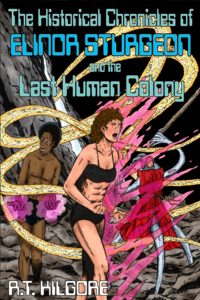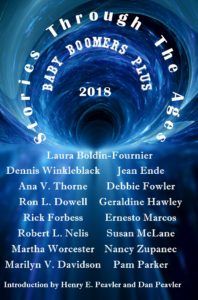Short Story Contests
Baby Boomers Plus 2019 submissions are open. The deadline is June 15. Stories may be about any topic. Tell us about an experience growing up, or use the experience gained from being a Baby Boomer and tell us a story. Part of the fun of this series is seeing what the baby boomers choose to write about and how they handle the topics.
Submissions are open for Sightseer Saga. We are asking for stories about your travels. You know, the time you drove down the pedestrian path in Luxembourg because you couldn’t read the sign – oh wait that was one of us, but we know you have stories too. You define what travel means to you. First class or backpacker, local, domestic or international, it doesn’t matter we want to see them all! Give us straight facts or embellish the story a bit. Just make sure you entertain us. This contest will be a little different. We are not going to set a deadline. We will accept submissions until we have 100 entries.
Musically Literate: A Music And Literature Gathering
R.T. Kilgore is having a reading and signing of ‘The Historical Chronicles of Elinor Sturgeon and the Last Human Colony’ at Bookwoman in Austin. It will be April 30th @ 7pm.
She is also co-hosting Musically Literate: A Music and Literature Gathering at Barracuda Austin. The event features R.T. Kilgore and other local talent. The doors open at 1:30, her reading is at 2:00. You can say you are coming on the Facebook page.
Past short story editors
Some of our short story authors have published books after having their stories published in our Stories Through The Ages series:
Kyandreia Jones, whose story ‘At Home’ was in our College Edition 2017 has published a children’s book called ‘Choose Your Own Adventure Spies: James Armistead Lafayette’ it can be found on Amazon.
Laura Boldin-Fournier, whose story ‘Trial by Water’ was in Baby Boomers Plus 2018 has published a children’s book called ‘An Orangutan’s Night Before Christmas’. You can see her YouTube video here.
Susan Lowell, whose story ‘Ironwork’ was in Baby Boomers Plus 2017 has a story collection “Two Desperados” which has won the George Garrett Fiction Award. The collection will be published by Texas Review Press this year. We will provide a link on our website when it is available.
Compliments by Dan Peavler
Living Springs Publishers recently asked for and received many testimonials from authors of our Stories Through the Ages books. The response was tremendous. Reading the testimonials triggered my memory back to 1970 when I was playing basketball for Metropolitan State University in Denver, Colorado.
On a very cold night our basketball team was playing in Kearney, Nebraska. Surprisingly there were many fans at the game despite the snowy conditions. That night I played the best game of my college career. I felt energized and played as hard as I could the entire game. The rebounds seemed to bounce my way and most of my shots found the bottom of the net.
After the game ended I followed my coach towards the locker room. An older man in bib overhauls stopped in front of us and extended his hand.
“I really appreciate your effort tonight,” he stated, shaking my hand. “Your shooting was fun to watch. Glad to have come out in this storm to watch the game.”
I lowered my head and said, “I was just lucky tonight.”
I followed coach into the locker room as the man left down the hallway. The moment we entered the locker room coach turned around and looked me straight in the eyes.
“Don’t ever respond to a compliment like that again. The time that man took to seek you out is not meaningless,” he said very firmly. “Right now you don’t understand how far and in between true compliments will be in your life. You should have looked that man in the eyes and thanked him. There are many positive possibilities you miss from downplaying compliments.”
I never deflected a compliment again. Which brings me back to Living Springs Publishers response to the testimonials. We thank all of the authors for taking the time and effort for the sincere compliments. We realize how fortunate we are to have partnered with you in creating these wonderful books.
THE SPHINX: by Henry Peavler
I just finished Mark Twain’s The Innocents Abroad or The New Pilgrims Progress and it triggered a whole slew of blog topics in my mind, including censorship and political correctness. Some of his descriptions of the native people of the Arab countries would be banned in certain places today. But, on the other hand, it would be required reading in other places. The whole issue of censorship is a sore point with me, believing, as I do, that I should be able to write whatever I want—it’s my prerogative as a citizen of this great country—like Freedom of Speech, Freedom of the Press. So why does the Gestapo division of my publishing company constantly tell me ‘that is inappropriate’ or ‘you can’t say that’. Censorship my friends! But, I digress, because that isn’t what I wanted to say about The Innocents Abroad.
Twain’s dramatic description of the Sphinx triggered a memory of a time in 1955. Mrs. Roper had invited the parents to visit us after school for a special program about what we were studying at the time.
We students were abuzz with excitement as we helped prepare for the festivities. Mrs. Roper spread a large sheet of white butcher paper on the wall. She stretched it from the blackboard to the window. I was ablaze with curiosity. Then she summoned Mary Jean Larson, Peggy Burrell and Shirley Lipscomb. They huddled near the butcher paper then began sketching and putting colored string on the paper leading to pages from the National Geographic. Oh, I was dying to get into the fray, but we were given strict orders to focus on our work assignment, until called, and not look at what the girls were doing. Well, that was like a direct order to do just the opposite, so we all hunkered down toward the desk, looking at our books with one eye and the butcher paper with the other.
Out of the blue, Mrs. Roper called me to the project and explained what it was. A depiction of the Nile River from the Mediterranean Sea to the Great Pyramids. We had been studying geography, not my favorite subject, so it came as a bit of a surprise. The possibility exists that I hadn’t been paying attention during the lessons. I was summoned not because of my geography skills, but because I could free-hand draw. It was my exalted task to draw the Great Sphinx of Giza.
I strutted back to my desk to retrieve pencil and eraser. Kenny and Ron glared at me out of one eye. I don’t even want to comment on the ugly look I received from Mary Jean Larson who was assigned to draw the pyramids, a simple draftsman–she used a ruler. I was an artist.
With face contorted in concentration, I set to it. After sketching with pencil, I filled in with ink. When complete, Mrs. Roper couldn’t heap enough praise on my shoulders. I blew up with so much pride, I fairly floated out to recess. I thought about shooting marbles, but my mind was still a swirl with Mrs. Roper’s cries of adulation. I couldn’t stand it, I had to go back inside and gaze at my creation. As I stood admiring the masterpiece, a marvelous idea suddenly flooded through my body like electricity. I would draw Sphinx’s from Cairo to Alexandria. I even turned one backward so he could gaze out into the desert protecting the citizens from angry hordes of Bedouin’s charging through the sand. I finished just as my classmates filed back from recess.
I could see the admiration in their eyes as they observed the marvelous display of art that I had created. Mrs. Roper crumbled into a chair, overcome with emotion. Mary Jean Larson had to bring her a glass of water. I was bursting with pride until the moment she regained her senses and shouted, “There’s only one, in the whole world, Henry, haven’t you been listening?”
The possibility exists that I wasn’t!




